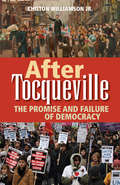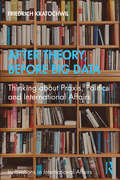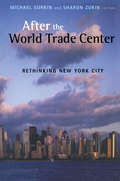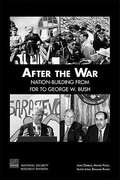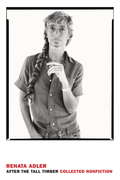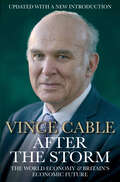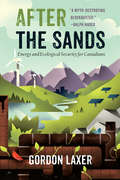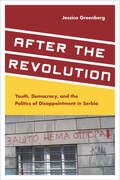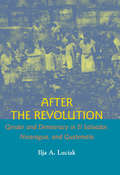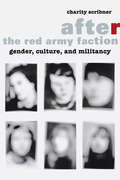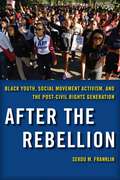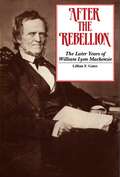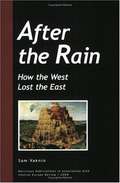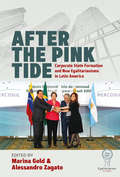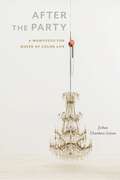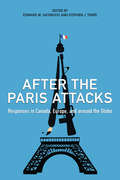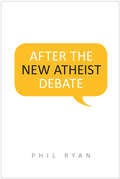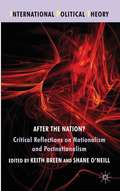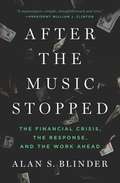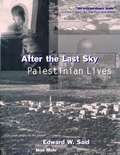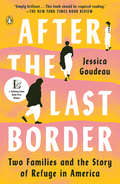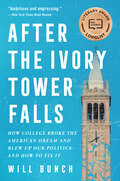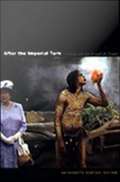- Table View
- List View
After Tocqueville: The Promise and Failure of Democracy
by Chilton Williamson Jr.The End of Democracy? The fall of the Berlin Wall. The collapse of the Iron Curtain. The Orange Revolution. The Arab Spring.The rush of events in recent decades seems to confirm that Alexis de Tocqueville was right: the future belongs to democracy. But take a closer look. The history of democracy since the 1830s, when Tocqueville wrote Democracy in America, reveals a far more complicated picture. And the future, author Chilton Williamson Jr. demonstrates, appears rather unpromising for democratic institutions around the world.The fall of communism sparked the popular notion that the spread of democracy was inevitable. After Tocqueville challenges this sunny notion. Various aspects of twenty-first-century life that Tocqueville could scarcely have imagined—political, economic, social, religious, intellectual, technological, environmental—militate against democracy, both in developing societies and in the supposedly democratic West.This piercing, elegantly written book raises crucial questions about the future of democracy.
After Theory, Before Big Data: Thinking about Praxis, Politics and International Affairs (Innovations in International Affairs)
by Friedrich KratochwilThis book’s key purpose is to contribute to the ongoing "theoretical" discussion in the field of international relations (IR) concerning the status of grand theories. However, it also has a wider, critical mission: to challenge mainstream social science and its dominant methodology, as well as the unfettered optimism that the problem of social order can be solved by the "application" of scientific knowledge to our practical problems. The author uses rigorous philosophical analysis to focus on the unexamined assumptions that form the bedrock of many contemporary scholars in IR and demonstrates the unavailability of a universal "scientific" procedure for finding the facts, when we face practical choices and issues of social reproduction. This book will be of interest to upper-level students of IR, sociology, history, and philosophy of science; it will also speak to students of security, foreign policy making, migration, and political economy, in addressing the basis of their attitudes in thinking about the world and the role of scholarship.
After the World Trade Center: Rethinking New York City (Cultural Spaces)
by Michael Sorkin Sharon ZukinThe terrorist attacks of September 11 have created an unprecedented public discussion about the uses and meanings of the central area of lower Manhattan that was once the World Trade Center. While the city sifts through the debris, contrary forces shaping its future are at work. Developers jockey to control the right to rebuild "ground zero." Financial firms line up for sweetheart deals while proposals for memorials are gaining in appeal. In After the World Trade Center, eminent social critics Sharon Zukin and Michael Sorkin call on New York's most acclaimed urbanists to consider the impact of the terrorist attack on the World Trade Center and what it bodes for the future of New York. Contributors take a close look at the reaction to the attack from a variety of New York communities and discuss possible effects on public life in the city.
After the War: Nation-building from FDR to George W. Bush
by Austin Long Michele A. Poole James Dobbins Benjamin RunkleFrom the post-World War II era through the Cold War, post-Cold War era, and current war on terrorism, this volume assesses how U.S. presidential decisionmaking style and administrative structure can work in favor of, as well as against, the nation-building goals of the U.S. government and military and those of its coalition partners and allies.
After the Tall Timber
by Renata Adler Michael WolffWhat is really going on here? For decades Renata Adler has been asking and answering this question with unmatched urgency. In her essays and long-form journalism, she has captured the cultural zeitgeist, distrusted the accepted wisdom, and written stories that would otherwise go untold. As a staff writer at The New Yorker from 1963 to 2001, Adler reported on civil rights from Selma, Alabama; on the war in Biafra, the Six-Day War, and the Vietnam War; on the Nixon impeachment inquiry and Congress; on cultural life in Cuba. She has also written about cultural matters in the United States, films (as chief film critic for The New York Times), books, politics, television, and pop music. Like many journalists, she has put herself in harm's way in order to give us the news, not the "news" we have become accustomed to--celebrity journalism, conventional wisdom, received ideas--but the actual story, an account unfettered by ideology or consensus. She has been unafraid to speak up when too many other writers have joined the pack. In this sense, Adler is one of the few independent journalists writing in America today.This collection of Adler's nonfiction draws on Toward a Radical Middle (a selection of her earliest New Yorker pieces), A Year in the Dark (her film reviews), and Canaries in the Mineshaft (a selection of essays on politics and media), and also includes uncollected work from the past two decades. The more recent pieces are concerned with, in her words, "misrepresentation, coercion, and abuse of public process, and, to a degree, the journalist's role in it." With a brilliant literary and legal mind, Adler parses power by analyzing language: the language of courts, of journalists, of political figures, of the man on the street. In doing so, she unravels the tangled narratives that pass for the resolution of scandal and finds the threads that others miss, the ones that explain what really is going on here--from the Watergate scandal, to the "preposterous" Kenneth Starr report submitted to the House during the Clinton impeachment inquiry, to the plagiarism and fabrication scandal of the former New York Times reporter Jayson Blair. And she writes extensively about the Supreme Court and the power of its rulings, including its fateful decision in Bush v. Gore.
After the Storm: The World Economy and Britain's Economic Future
by Vince CableFrom the bestselling author of The Storm comes a fascinating insight into the state of the British economy from one of our leading politicians, who was at the heart of the coalition government. Vince Cable's bestselling book, The Storm, explored and explained the causes of the 2008 world economic crisis and how Britain should respond to the great challenges it brought. In After the Storm, Cable, who was Business Secretary in the 2010-2015 coalition government, provides a unique perspective on the state of the global financial markets and how the British economy has fared since 2008. Providing a previously unreported inside view of the Coalition, After the Storm offers a carefully considered perspective on how the British economy should be managed over the next decade and beyond. This timely book is a fascinating and urgent intervention from one of the key figures in British politics of the past two decades.
After the Sands
by Gordon LaxerAfter the Sands outlines a vision and a road map to transitioning Canada to a low-carbon society.Despite its oil abundance, with no strategic reserves, Canada is woefully unprepared for the next global oil supply crisis. There's no good reason for Canadians to use much more oil per capita than people in other sparsely populated, northern countries like Norway, Finland and Sweden-nations that use 27 to 39 percent less oil per person. In After the Sands, Alberta-based political economist Gordon Laxer proposes a bold strategy of deep conservation and a Canada-first perspective to ensure that all Canadians have sufficient energy at affordable prices.The most achievable way to gain energy security is to supply Canadians with their own oil, natural gas and renewable energy. And the best way to cut carbon emissions is by phasing out Canada's role as a carbon-fuel exporter.Canada has all the oil, gas and coal needed to transition to a low-carbon future. Remarkable hydro power resources give Canadians a large base of renewable energy, which can be expanded with wind, solar, geothermal and biomass. Few countries have these options in adequate quantities. But, as Laxer argues, Canada will not get there until we overcome the power of vested interests and untangle the trade agreements that block Canadians from secure and fair access to the nation's own energy resources.Impeccably researched, After the Sands is critical reading for anyone concerned with climate change and the future of Canada.
After the Revolution: Youth, Democracy, and the Politics of Disappointment in Serbia
by Jessica GreenbergWhat happens to student activism once mass protests have disappeared from view, and youth no longer embody the political frustrations and hopes of a nation? After the Revolution chronicles the lives of student activists as they confront the possibilities and disappointments of democracy in the shadow of the recent revolution in Serbia. Greenberg's narrative highlights the stories of young student activists as they seek to define their role and articulate a new form of legitimate political activity, post-socialism. When student activists in Serbia helped topple dictator Slobodan Milosevic on October 5, 2000, they unexpectedly found that the post-revolutionary period brought even greater problems. How do you actually live and practice democracy in the wake of war and the shadow of a recent revolution? How do young Serbians attempt to translate the energy and excitement generated by wide scale mobilization into the slow work of building democratic institutions? Greenberg navigates through the ranks of student organizations as they transition their activism from the streets back into the halls of the university. In exploring the everyday practices of student activists#151;their triumphs and frustrations#151;After the Revolution argues that disappointment is not a failure of democracy but a fundamental feature of how people live and practice it. This fascinating book develops a critical vocabulary for the social life of disappointment with the aim of helping citizens, scholars, and policymakers worldwide escape the trap of framing new democracies as doomed to failure.
After the Revolution: Youth, Democracy, and the Politics of Disappointment in Serbia
by Jessica GreenbergWhat happens to student activism once mass protests have disappeared from view, and youth no longer embody the political frustrations and hopes of a nation? After the Revolution chronicles the lives of student activists as they confront the possibilities and disappointments of democracy in the shadow of the recent revolution in Serbia. Greenberg's narrative highlights the stories of young student activists as they seek to define their role and articulate a new form of legitimate political activity, post-socialism. When student activists in Serbia helped topple dictator Slobodan Milosevic on October 5, 2000, they unexpectedly found that the post-revolutionary period brought even greater problems. How do you actually live and practice democracy in the wake of war and the shadow of a recent revolution? How do young Serbians attempt to translate the energy and excitement generated by wide scale mobilization into the slow work of building democratic institutions? Greenberg navigates through the ranks of student organizations as they transition their activism from the streets back into the halls of the university. In exploring the everyday practices of student activists#151;their triumphs and frustrations#151;After the Revolution argues that disappointment is not a failure of democracy but a fundamental feature of how people live and practice it. This fascinating book develops a critical vocabulary for the social life of disappointment with the aim of helping citizens, scholars, and policymakers worldwide escape the trap of framing new democracies as doomed to failure.
After the Revolution: Gender and Democracy in El Salvador, Nicaragua, and Guatemala
by Ilja A. LuciakHow women active in guerilla movements become active in politics after the war. Complements Bayard de Volo's Mothers, Heroes, Martyrs:Gender Identity Politics in Nicaragua, 1979–1999."Gender equality and meaningful democratization are inextricably linked," writes Ilja Luciak. "The democratization of Central America requires the full incorporation of women as voters, candidates, and office holders." In After the Revolution: Gender and Democracy in El Salvador, Nicaragua, and Guatemala, Luciak shows how former guerrilla women in three Central American countries made the transition from insurgents to mainstream political players in the democratization process.Examining the role of women in the various stages of revolutionary and national politics, Luciak begins with women as participants and leaders in guerrilla movements. Women contributed greatly to the revolutionary struggle in all three countries, but thereafter many similarities ended. In Guatemala, ideological disputes reduced women's political effectiveness at both the intra-party and national levels. In Nicaragua, although women's rights became a secondary issue for the revolutionary party, women were nonetheless able to put the issue on the national agenda. In El Salvador, women took leading roles in the revolutionary party and were able to incorporate women's rights into a broad reform agenda. Luciak cautions that while active measures to advance the political role of women have strengthened formal gender equality, only the joint efforts of both sexes can lead to a successful transformation of society based on democratic governance and substantive gender equality.
After the Red Army Faction: Gender, Culture, and Militancy
by Charity ScribnerMasterminded by women, the Red Army Faction (RAF) terrorized West Germany from the 1970s to the 1990s. Afterimages of its leaders persist in the works of pivotal artists and writers, including Gerhard Richter, Elfriede Jelinek, and Slavoj i ek. Why were women so prominent in the RAF? What does the continuing cultural response to the German armed struggle tell us about the representation of violence, power, and gender today? Engaging critical theory, Charity Scribner addresses these questions and analyzes signal works that point beyond militancy and terrorism. This literature and art discloses the failures of the Far Left and registers the radical potential that RAF women actually forfeited.After the Red Army Faction maps out a cultural history of militancy and introduces "postmilitancy" as a new critical term. <P><P>As Scribner demonstrates, the most compelling examples of postmilitant culture don't just repudiate militancy: these works investigate its horizons of possibility, particularly on the front of sexual politics. Objects of analysis include as-yet untranslated essays by Theodor Adorno and Jürgen Habermas, as well as novels by Friedrich Dürrenmatt and Judith Kuckart, Johann Kresnik's Tanztheaterstück Ulrike Meinhof, and the blockbuster exhibition Regarding Terror at the Berlin Kunst-Werke. Scribner focuses on German cinema, offering incisive interpretations of films by Margarethe von Trotta, Volker Schlöndorff, and Fatih Akin, as well as the international box-office success The Baader-Meinhof Complex. These readings disclose dynamic junctures among several fields of inquiry: national and sexual identity, the disciplining of the militant body, and the relationship between mass media and the arts.
After the Rebellion: Black Youth, Social Movement Activism, and the Post-Civil Rights Generation
by Sekou M. FranklinWhat happened to black youth in the post-civil rights generation? What kind of causes did they rally around and were they even rallying in the first place? After the Rebellion takes a close look at a variety of key civil rights groups across the country over the last 40 years to provide a broad view of black youth and social movement activism. Based on both research from a diverse collection of archives and interviews with youth activists, advocates, and grassroots organizers, this book examines popular mobilization among the generation of activists - principally black students, youth, and young adults - who came of age after the passage of the 1964 Civil Rights Act and the Voting Rights Act of 1965. Franklin argues that the political environment in the post-Civil Rights era, along with constraints on social activism, made it particularly difficult for young black activists to start and sustain popular mobilization campaigns. Building on case studies from around the country--including New York, the Carolinas, California, Louisiana, and Baltimore--After the Rebellion explores the inner workings and end results of activist groups such as the Southern Negro Youth Congress, Student Nonviolent Coordinating Committee, the Student Organization for Black Unity, the Free South Africa Campaign, the New Haven Youth Movement, the Black Student Leadership Network, the Juvenile Justice Reform Movement, and the AFL-CIO's Union Summer campaign. Franklin demonstrates how youth-based movements and intergenerational campaigns have attempted to circumvent modern constraints, providing insight into how the very inner workings of these organizations have and have not been effective in creating change and involving youth. A powerful work of both historical and political analysis, After the Rebellion provides a vivid explanation of what happened to the militant impulse of young people since the demobilization of the civil rights and black power movements - a discussion with great implications for the study of generational politics, racial and black politics, and social movements.
After the Rebellion: The Later Years of William Lyon Mackenzie
by Lilian F. GatesThis comprehensive book on William Lyon Mackenzie’s later life focuses first on the period 1838-1849, Mackenzie’s years in exile in the United States. It examines his contribution to the American political scene, including his role in writing the constitution of the State of New York. The book also chronicles Mackenzie’s life from 1849, when he was granted amnesty and returned to Canada, to his death in 1861. In this, the only comprehensive look at Mackenzie’s life, Lillian Gates offers a meticulous account of one of Canada’s liveliest nineteenth century politicians.
After the Rain: how the West lost the East
by Samuel VakninAn anthology of more than 50 articles regarding the politics, economics, geopolitics and history of countries in central and eastern Europe and the Balkans.
After the Protests Are Heard: Enacting Civic Engagement and Social Transformation (Religion and Social Transformation #7)
by Sharon D WelchWhen the protests are over, a guide to creating long-lasting social change beyond the barricadesFrom the Women’s March in D.C. to #BlackLivesMatter rallies across the country, there has been a rising wave of protests and social activism. These events have been an important part of the battle to combat racism, authoritarianism, and xenophobia in Trump’s America. However, the struggle for social justice continues long after the posters and megaphones have been packed away. After the protests are heard, how can we continue to work toward lasting change? This book is an invaluable resource for anyone invested in the fight for social justice. Welch highlights examples of social justice work accomplished at the institutional level. From the worlds of social enterprise, impact investing, and sustainable business, After the Protests Are Heard describes the work being done to promote responsible business practices and healthy, cooperative communities. The book also illuminates how colleges and universities educate students to strive toward social justice on campuses across the country, such as the Engaged Scholarship movement, which fosters interactions between faculty and students and local and global communities. In each of these instances, activists work from within institutions to transform practices and structures to foster justice and equality. After the Protests Are Heard confronts the difficult reality that social change is often followed by spikes in violence and authoritarianism. It offers important insights into how the nation might more fully acknowledge the brutal costs of racism and the historical drivers of racial injustice, and how people of all races can contain such violence in the present and prevent its resurgence in the future. For many members of the social justice community, the real work begins when the protests end. After the Protests Are Heard is a must-read for everyone interested in social justice and activism – from the barricades and campuses to the breakrooms and cubicles.
After the Pink Tide: Corporate State Formation and New Egalitarianisms in Latin America (Egalitarianism #1)
by Marina Gold Alessandro ZagatoThe left-wing Pink Tide movement that swept across Latin America seems now to be overturned, as a new wave of free-market thinkers emerge across the continent. This book analyses the emergence of corporate power within Latin America and the response of egalitarian movements across the continent trying to break open the constraints of the state. Through an ethnographically grounded and localized anthropological perspective, this book argues that at a time when the regular structures of political participation have been ruptured, the Latin American context reveals multiple expressions of egalitarian movements that strive (and sometimes momentarily manage) to break through the state’s apparatus.
After the Party: A Manifesto for Queer of Color Life (Sexual Cultures #4)
by Joshua Chambers-LetsonA new manifesto for performance studies on the art of queer of color worldmaking. After the Party tells the stories of minoritarian artists who mobilize performance to produce freedom and sustain life in the face of subordination, exploitation, and annihilation. Through the exemplary work of Nina Simone, Jorge Ignacio Cortiñas, Danh Vō, Felix Gonzalez-Torres, Eiko, and Tseng Kwong Chi, and with additional appearances by Nao Bustamante, Audre Lorde, Martin Wong, Assata Shakur, and Nona Faustine, After the Party considers performance as it is produced within and against overlapping histories of US colonialism, white supremacy, and heteropatriarchy. Building upon the thought of José Esteban Muñoz alongside prominent scholarship in queer of color critique, black studies, and Marxist aesthetic criticism, Joshua Chambers-Letson maps a portrait of performance’s capacity to produce what he calls a communism of incommensurability, a practice of being together in difference. Describing performance as a rehearsal for new ways of living together, After the Party moves between slavery, the Civil Rights Movement, the first wave of the AIDS crisis, the Vietnam War, and the catastrophe-riddled horizon of the early twenty-first century to consider this worldmaking practice as it is born of the tension between freedom and its negation. With urgency and pathos, Chambers-Letson argues that it is through minoritarian performance that we keep our dead alive and with us as we struggle to survive an increasingly precarious present.
After the Paris Attacks: Responses in Canada, Europe, and around the Globe
by Edward M. Iacobucci Stephen J. ToopeThe violent attacks on journalists at Charlie Hebdo and shoppers in a Jewish supermarket in Paris in January 2015 raise important questions concerning security, terrorism, and the role of the media in fostering public debate about multiculturalism and freedom of expression. After the Paris Attacks brings together a group of leading scholars, journalists, and political observers to explore how the world reacted to these events and to examine what opportunities exist for a saner and safer future. This timely, interdisciplinary volume presents perspectives from experts in fields such as law, political science, philosophy, and international relations, as well as from the media, offering penetrating insights into how the world can and should respond to the challenge of recent events.
After the New Atheist Debate
by Phil RyanThe first decade of the twenty-first century saw a number of best-selling books which not only challenged the existence of god, but claimed that religious faith was dangerous and immoral. The New Atheists, as writers such as Richard Dawkins, Christopher Hitchens, Sam Harris, and Daniel Dennett have become known, sparked a vicious debate over religion's place in modern society.In After the New Atheist Debate, Phil Ryan offers both an elegant summary of this controversy and a path out of the cul-de-sac that this argument has become. Drawing on the social sciences, philosophy, and theology, Ryan examines the claims of the New Atheists and of their various religious and secular opponents and finds both sides wanting.Rather than the mutual demonization that marks the New Atheist debate, Ryan argues that modern society needs respectful ethical dialogue in which citizens present their points of view and seek to understand the positions of others. Lucidly written and clearly argued, After the New Atheist Debate is a book that brings welcome clarity and a solid path to the often contentious conversation about religion in the public sphere.
After the Nation?
by Keith Breen Shane O 8216 NeilExplores the ways in which the nation-state and nationalism are challenged by contemporary realities. This volume addresses changes to our understanding of national sovereignty, problems posed by violent conflict between rival national projects, the feasibility of postnationalist democracy and citizenship, and the debate over global justice.
After the Music Stopped: The Financial Crisis, the Response, and the Work Ahead
by Alan S. BlinderNew York Times BestsellerOne of our wisest and most clear-eyed economic thinkers offers a masterful narrative of the crisis and its lessons.Many fine books on the financial crisis were first drafts of history—books written to fill the need for immediate understanding. Alan S. Blinder, esteemed Princeton professor, Wall Street Journal columnist, and former vice chairman of the Federal Reserve Board, held off, taking the time to understand the crisis and to think his way through to a truly comprehensive and coherent narrative of how the worst economic crisis in postwar American history happened, what the government did to fight it, and what we can do from here—mired as we still are in its wreckage.With bracing clarity, Blinder shows us how the U.S. financial system, which had grown far too complex for its own good—and too unregulated for the public good—experienced a perfect storm beginning in 2007. Things started unraveling when the much-chronicled housing bubble burst, but the ensuing implosion of what Blinder calls the “bond bubble” was larger and more devastating. Some people think of the financial industry as a sideshow with little relevance to the real economy—where the jobs, factories, and shops are. But finance is more like the circulatory system of the economic body: if the blood stops flowing, the body goes into cardiac arrest. When America’s financial structure crumbled, the damage proved to be not only deep, but wide. It took the crisis for the world to discover, to its horror, just how truly interconnected—and fragile—the global financial system is. Some observers argue that large global forces were the major culprits of the crisis. Blinder disagrees, arguing that the problem started in the U.S. and was pushed abroad, as complex, opaque, and overrated investment products were exported to a hungry world, which was nearly poisoned by them.The second part of the story explains how American and international government intervention kept us from a total meltdown. Many of the U.S. government’s actions, particularly the Fed’s, were previously unimaginable. And to an amazing—and certainly misunderstood—extent, they worked. The worst did not happen. Blinder offers clear-eyed answers to the questions still before us, even if some of the choices ahead are as divisive as they are unavoidable. After the Music Stopped is an essential history that we cannot afford to forget, because one thing history teaches is that it will happen again.
After the Last Sky: Palestinian Lives
by Edward W. Said Jean MohrA searing portrait of Palestinian life and identity that is at once an exploration of Edward Said's unclaimable past and a testimony to the lives of those living in exile.
After the Last Border: Two Families and the Story of Refuge in America
by Jessica GoudeauThe story of two refugee families and their hope and resilience as they fight to survive and belong in AmericaThe welcoming and acceptance of immigrants and refugees has been central to America's identity for centuries--yet America has periodically turned its back at the times of greatest humanitarian need. After the Last Border is an intimate look at the lives of two women as they struggle for the twenty-first century American dream, having won the "golden ticket" to settle as refugees in Austin, Texas.Mu Naw, a Christian from Myanmar struggling to put down roots with her family, was accepted after decades in a refugee camp at a time when America was at its most open to displaced families; and Hasna, a Muslim from Syria, agrees to relocate as a last resort for the safety of her family--only to be cruelly separated from her children by a sudden ban on refugees from Muslim countries. Writer and activist Jessica Goudeau tracks the human impacts of America's ever-shifting refugee policy as both women narrowly escape from their home countries and begin the arduous but lifesaving process of resettling in Austin, Texas--a city that would show them the best and worst of what America has to offer.After the Last Border situates a dramatic, character-driven story within a larger history--the evolution of modern refugee resettlement in the United States, beginning with World War II and ending with current closed-door policies--revealing not just how America's changing attitudes toward refugees has influenced policies and laws, but also the profound effect on human lives.
After the Ivory Tower Falls: How College Broke the American Dream and Blew Up Our Politics—and How to Fix It
by Will BunchFrom Pulitzer Prize–winning journalist Will Bunch, the epic untold story of college—the great political and cultural fault line of American life"This book is simply terrific." —Heather Cox Richardson, publisher of the "Letters from an American" Substack"A must-read." —Nancy MacLean, author of Democracy in ChainsToday there are two Americas, separate and unequal, one educated and one not. And these two tribes—the resentful “non-college” crowd and their diploma-bearing yet increasingly disillusioned adversaries—seem on the brink of a civil war. The strongest determinant of whether a voter was likely to support Donald Trump in 2016 was whether or not they attended college, and the degree of loathing they reported feeling toward the so-called “knowledge economy of clustered, educated elites. Somewhere in the winding last half-century of the United States, the quest for a college diploma devolved from being proof of America’s commitment to learning, science, and social mobility into a kind of Hunger Games contest to the death. That quest has infuriated both the millions who got shut out and millions who got into deep debt to stay afloat.In After the Ivory Tower Falls, award-winning journalist Will Bunch embarks on a deeply reported journey to the heart of the American Dream. That journey begins in Gambier, Ohio, home to affluent, liberal Kenyon College, a tiny speck of Democratic blue amidst the vast red swath of white, post-industrial, rural midwestern America. To understand “the college question,” there is no better entry point than Gambier, where a world-class institution caters to elite students amidst a sea of economic despair.From there, Bunch traces the history of college in the U.S., beginning with the first technical schools, through the landmark GI Bill, and the culture wars of the 60’s and 70’s, which found their start on college campuses. We see how resentment of college-educated elites morphed into a rejection of knowledge itself—and how the explosion in student loan debt fueled major social movements like Occupy Wall Street. Bunch then takes a question we need to ask all over again—what, and who, is college even for?—and pushes it into the 21st century by proposing a new model that works for all Americans.The sum total is a stunning work of journalism, one that lays bare the root of our political, cultural, and economic division—and charts a path forward for America.
After the Imperial Turn: Thinking with and Through the Nation
by Antoinette BurtonFrom a variety of historically grounded perspectives, After the Imperial Turn assesses the fate of the nation as a subject of disciplinary inquiry. In light of the turn toward scholarship focused on imperialism and postcolonialism, this provocative collection investigates whether the nation remains central, adequate, or even possible as an analytical category for studying history. These twenty essays, primarily by historians, exemplify cultural approaches to histories of nationalism and imperialism even as they critically examine the implications of such approaches. While most of the contributors discuss British imperialism and its repercussions, the volume also includes, as counterpoints, essays on the history and historiography of France, Germany, Spain, and the United States. Whether looking at the history of the passport or the teaching of history from a postnational perspective, this collection explores such vexed issues as how historians might resist the seduction of national narratives, what--if anything--might replace the nation's hegemony, and how even history-writing that interrogates the idea of the nation remains ideologically and methodologically indebted to national narratives. Placing nation-based studies in international and interdisciplinary contexts, After the Imperial Turn points toward ways of writing history and analyzing culture attentive both to the inadequacies and endurance of the nation as an organizing rubric. Contributors. Tony Ballantyne, Antoinette Burton, Ann Curthoys, Augusto Espiritu, Karen Fang, Ian Christopher Fletcher, Robert Gregg, Terri Hasseler, Clement Hawes, Douglas M. Haynes, Kristin Hoganson, Paula Krebs, Lara Kriegel, Radhika Viyas Mongia, Susan Pennybacker, John Plotz, Christopher Schmidt-Nowara, Heather Streets, Hsu-Ming Teo, Stuart Ward, Lora Wildenthal, Gary Wilder
